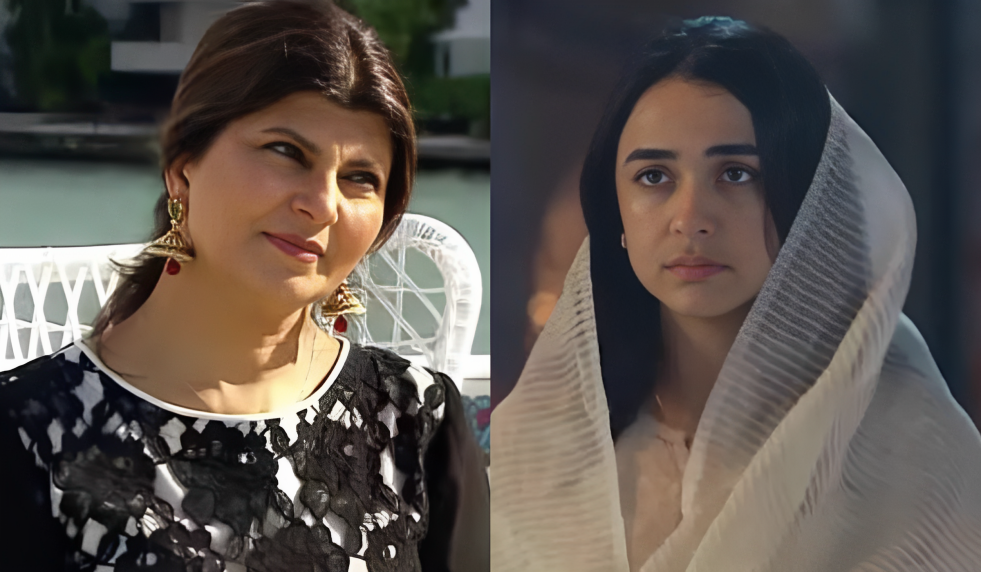Renowned actor Rubina Ashraf recently shared her thoughts on Yumna Zaidi’s performance in the TV serial “Tere Bin” during an interview on a local channel.
In her candid remarks,Rubina Ashraf expressed her views on Zaidi’s alleged lack of control over her character, stating that it fails to leave a lasting impression on her as an actor. However, she acknowledged that the limitations may lie with the script rather than Zaidi herself.
Analyzing Yumna Zaidi’s Performance in “Tere Bin”: A Critical Assessment
During the interview,Roubina Ashraf expressed her observation by stating, “She does not really impress me as an actor because she’s hopping from one place to another, saying whatever is written. It’s not her fault. But she’s making her character seem like that of a confused woman.”
Responding to the host’s interjection, who questioned Zaidi’s ability to alter her character, Ashraf asserted, “We change it. I said this, maybe you didn’t hear. An actor, especially if they’ve been working for 15 years, has that margin to fix those small things.”
She further elaborated on the examples of male actors taking charge of the script, citing Imran Ashraf and Wahaj Ali as examples. “Like, I am sure, Murtasim (Ali) is doing with his character, but she is not doing that.”
The Dynamics of Script Alterations: Challenges Faced by Female Actors
WhileRubina Ashraf’s comments sparked a debate in the industry and among fans, it is important to analyze the dynamics of demanding changes to the script, particularly for women actors. In the entertainment industry, where patriarchal norms often persist, the ability of female actors to demand alterations to their characters or scripts may face challenges.
Historically, women in the industry have often encountered limitations and constraints when it comes to exercising creative control over their roles. Many factors, including the prevailing power dynamics, the influence of production teams, and societal expectations, may contribute to the perceived difficulty for women in demanding script changes.
However, it is worth noting that the industry has been evolving, with more female actors and creators asserting their agency and advocating for their artistic vision. A recently unearthed interview with Mawra Hocane showed how the actor pressed for changes in “Qissa Meherbano Ka,” leading to a change in the narrative that followed a particularly harrowing scene pertaining to marital rape.
Empowering Female Actors: Breaking Barriers and Shaping Narratives
In recent years, there has been a notable shift in the entertainment industry, as female actors strive for greater representation and creative control. With their influential presence, they are challenging traditional norms and fostering a more inclusive environment.
The rise of platforms like digital streaming services has opened up new avenues for storytelling, allowing diverse narratives to flourish. Female actors are increasingly leveraging these platforms to explore complex characters and address social issues that resonate with audiences. By taking charge of their roles, they can contribute to a more nuanced portrayal of women on screen.
While individual actors hold significant power in shaping their characters, collaboration and dialogue with directors, writers, and production teams remain crucial for effective storytelling. It is through these interactions that a collective vision emerges, resulting in a holistic and impactful portrayal of characters on screen.
By fostering an environment of open communication and mutual respect, industry stakeholders can create space for actors to voice their concerns, propose changes, and contribute to the growth and evolution of their characters. Such collaborative efforts can lead to more authentic and compelling narratives, enhancing the overall quality of the content produced.
The discussion surrounding Yumna Zaidi’s performance in the TV serial “Tere Bin” raises important questions about the dynamics of script alterations and the challenges faced by female actors in demanding changes to their characters. While the industry has witnessed positive changes in recent years, there is still progress to be made in empowering women actors to exercise greater creative control over their roles.
By promoting collaboration, dialogue, and inclusivity, the industry can foster an environment where all actors, regardless of gender, feel empowered to contribute their unique perspectives and shape narratives that resonate with audiences. Only through continued efforts and a commitment to change can we ensure a more equitable and vibrant entertainment industry.


